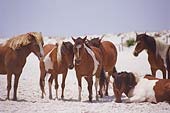
|
|
Download Options
| Image Name | Width x Height | Size |
|---|---|---|
| SIA0065.jpg | 640 x 439 | 43K |
| SIA0065.jpg | 1200 x 824 | 125K |
| SIA0065.jpg | 3336 x 2290 | 642K |
Caption
Assateague's wild horses are well known, even to many people who have never been to the island. The ‘wild’ horses on Assateague are actually feral animals, meaning that they are descendants of domestic animals that have reverted to a wild state.
Despite the often told tale of the horses swimming to Assateague from a shipwrecked Spanish galleon, the most plausible explanation is that they are the descendants of horses that were brought to barrier islands like Assateague in the late 17th century by mainland owners to avoid fencing laws and taxation of livestock.
Todays horses are actually the size of ponies (average 12- 13 hands) probably due to their poor diet and harsh environment. Some horses removed from Assateague as foals and fed a higher protein diet grow to horse size. Almost 80% of their diet is coarse salt marsh cord grass and American beach grass. Various grass species, greenbrier stems, bayberry twigs, rose hips, seaweeds and poison ivy make up the rest of their diet. The high concentration of salt in their diets causes the horses to drink twice as much fresh water as domestic horses. Because of this, the horses have a "fat" or "bloated" appearance. Although they will sip salty ocean or bay water, they actually drink very little of it.